Sea snot: The noxious plague troubling Istanbul's coast
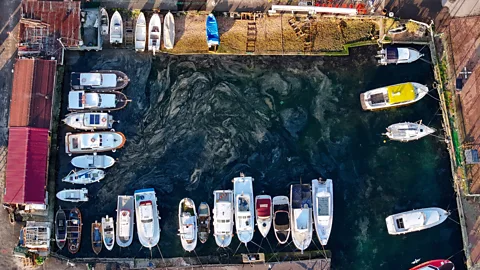 Getty Images
Getty ImagesAs summer warms Istanbul's waters, the megacity's authorities are having to battle a noxious algal bloom dubbed "sea snot".
On a crisp, bright late April day, when the cold poyraz winds blow down from the Black Sea in the north, Koenraad Marinus van der Lier contemplates the sea. He lives on Burgazada, an Istanbul islands where cars are forbidden, and the Sea of Marmara wraps around every corner like a big blue hug.
Marinus van der Lier is an artist. He is also a swimmer. Every sharp winter morning on the island, he swims in the sea just downhill from his studio, taking long strokes in the cold water. In the summer, the island fills up with weekend tourists and summer house residents, but during the off season, the sound of birds chirping and the soft wind in the fragrant pines comes through clear and strong.
Recently, though, Marinus van der Lier had to stop swimming. As the water and the weather warmed, a familiar plague returned to the Sea of Marmara. It's early in the season, but Marinus van der Lier has already seen the mucilage.
The Sea of Marmara is the world's smallest sea. It is also densely settled, highly industrialised, and semi-enclosed. "The Marmara Sea is like a bathtub," Marinus van der Lier notes. There are only two narrow entry points: the Bosphorus Strait, which leads to the Black Sea, and the Dardanelles Strait, which leads to the Aegean Sea. This makes the sea particularly vulnerable to marine mucilage, also colloquially known as sea snot.
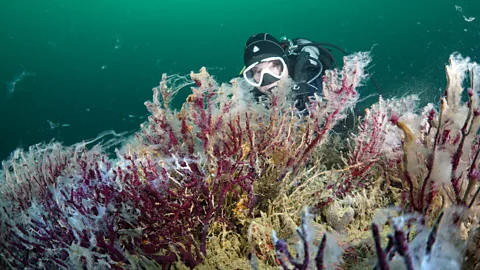 Tahsin Ceylan
Tahsin CeylanIn the early summer of 2021, a plague of mucilage struck the Sea of Marmara. The gunky, sticky ropes of algae hovered like a bad dream on the surface of the water, strangling fish and marine life, leaving a film of bacteria behind. The mucilage is an overgrowth of phytoplankton, which coats the living things in the water with a mucus-like layer of slime that prevent oxygen transfer and can kill fish larvae, eggs, mussels, corals and whatever else comes in its path. The global news leaped on the story and measures were taken to reduce the mucilage. By June 2021, the problem was declared under control. But the mucilage never fully went away. It's been deep under the surface, mucking things up far out of sight of 18 million people who call Istanbul home. And now, it is returning to the surface.
"Mucilage is essentially an ecological situation, an ecological disaster… but the situation we have experienced in the Sea of Marmara in recent years is not natural," says Mustafa Sarı, a professor in the department of water resources management at Bandirma Onyedi̇ Eylül University. According to Sarı, three factors coming together trigger the mucilage.
The first is climate. The world is getting hotter and so is the Sea of Marmara. "The Sea of Marmara is currently 2.5C warmer than the average temperature data of 40 years. The temperature is high," says Sarı. "In other words, it is related to climate and is [in the short term] beyond our control, we cannot control it. I wish we could."
The second is the natural state of the Sea of Marmara. The water that comes in from the Black Sea in the north is low in salt, while the water from the Mediterranean in the south is very salty. The difference in salinity and density means that the water from the two seas has trouble mixing together, creating a transition layer in the Sea of Marmara that limits the vertical circulation of the water. This can trap the mucilage under the top layer. "For this reason, the Sea of Marmara is an ideal environment for ecological events such as mucilage formation," says Sarı. "This is also out of our control."
The third factor, however, is human-made. There are more than 25 million people who live around the Sea of Marmara in and outside of Istanbul, and 50% of their waste goes into the sea without being treated, according to Sari. Seventy percent of the industrial and agricultural waste generated by factories and farms around the Sea of Marmara also goes into the sea without being treated. This pollution disrupts the nitrogen-phosphorus ratio in the water, which is the trigger that tips the balance.
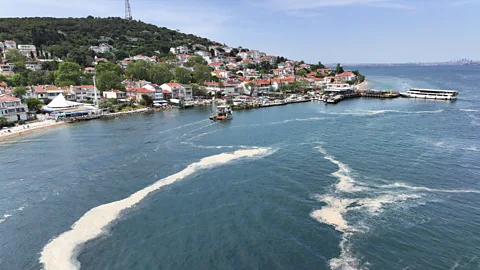 Getty Images
Getty Images"We can list hundreds of factors related to mucilage, contributing to mucilage, having a share in mucilage formation," says Sarı. "But when these three triggers come together, the catastrophic mucilage that we are experiencing in 2021 and now emerges."
Tahsin Ceylan has seen the disaster up close. He has been diving in the sea since 1985 and shooting underwater images for nearly as long, documenting the wild world that exists under the surface. "The more I get to know the blue world, the more it fascinates me. I try to be the voice and the eyes of that silent world," Ceylan says.
During the pandemic, he saw firsthand the blooming of mucilage underwater that erupted into the globby catastrophe during the summer of 2021. During those days, the thick carpet of mucilage that strangled the sea on the surface was the most visible symptom of the problem, but there was an equally thick layer under the water. In some of Tahsin's images, the sea snot wraps around the seagrass on the ocean floor like a sticky spider web of goo.
"It's a tragedy for bottom-dependent species," says Ceylan. "Unless the waste released into the Marmara Sea is purified, marine life is on the verge of extinction. The breakdown in the ecosystem is now at an irreversible point."
There are plans to address the mucilage, but aren't necessarily new The Marmara Sea Action Plan, consisting of 22 recommended actions, was created in 2021 by many concerned parties after that summer's sea snot bloom, including the Minister of the Environment, the President of the Parliamentary Environment Commission, and the mayors and the governors of the seven provinces that surround the Sea of Marmara.
Suggestions included monitoring all wastewater treatment plants that discharge into the sea, implementing studies that can raise awareness among citizens, and trying to establish the Sea of Marmara as a protected area. The plan was announced on 6 June 2021, and many of the suggestions were put into action. And yet, the mucilage remains.
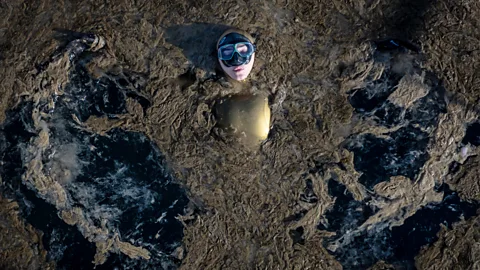 Getty Images
Getty Images"What happened in these three years? Unfortunately, we have not been able to reduce the pollution load in the Marmara Sea in three years," says Sari. "In 2021, the rate of advanced biological treatment of domestic waste was 51%, and by 2024, this rate was 51.7%. In other words, progress is not even 1%."
Though everyone came together to agree to the action plan, not everyone has followed through with the implementation. "If you ask me, everyone is responsible together… What interests me more than the reasons for the problems in implementation is why everyone who signed this action plan did not fulfil their responsibilities," says Sari. "We declared a special environmental protection area, great! We formed boards, great! We made decisions, great! We made plans, great! So what are these for? To reduce the pollution load! Were we able to reduce it? We could not reduce it."
In response, the Marmara Municipalities Union, the region's largest local government association, told the BBC: "Since the announcement of the Marmara Sea Action Plan in 2021, many of the commitments made have indeed been fulfilled. These include increased monitoring efforts, stakeholder coordination and public awareness campaigns. However, achieving the plan's full set of targets remains challenging due to factors beyond the control of its signees."
The association says that while several pollution sources have been addressed, insufficiently treated wastewater entering the sea is an ongoing problem and more investment and cooperation is needed to progress further. "Restoring [the sea's] health is essential to improving the quality of life for millions of people," the association says.
There have been other attempts to deal with the mucilage issue. One professor at Bursa Uludağ University is attempting to create "floating islands" that will naturally clean up pollution in the sea. There are also grassroots efforts to draw attention to the problem. A group called the Women Change Makers of Marmara have launched a petition advocating local government officials to take action to get rid of the mucilage and save the Sea of Marmara.
"As women from the Marmara ChangeMakers programme, ecological advocates rooted in the local communities of the Marmara Region, we carry the power to tell the story of the people most affected. We've come to realise that many of those living with the impacts of mucilage either aren't fully aware of the scale of the problem or feel powerless to take action," says Miray Saygı, on behalf of the community. "So our petition is one of the most peaceful and democratic ways to raise awareness and demand accountability from those in power."
The women of the Marmara ChangeMakers are optimistic, which drives their activism. They believe that as long as the steps in their proposal, or in the action plan, are carried out, the situation will improve for the better. "We've seen how quickly people can come together and take action when they truly care… Hope, for us, is action. As long as we continue to speak out, take actions, and demand change, hope is alive – and growing," says Saygı.
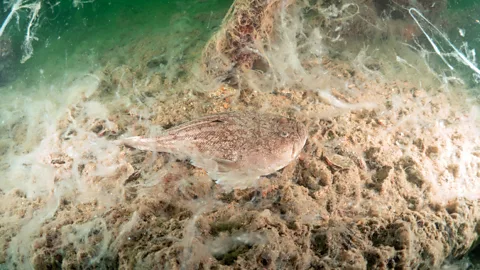 Tahsin Ceylan
Tahsin CeylanIn 2021, there was work to clean the mucilage from the sea, but its impact was mostly limited to the mucilage that was visible on the surface. The main solution will be a reduction in the pollution in the sea, and while the majority of that is industrial and should be addressed from authorities, regular consumers could help in their own small way by making sure they use detergents that don't contain phosphorus, for example, which contributes to the pollution in the sea.
Recent sediment cleaning projects in the Gulf of Izmit have already contributed to a reduction in the mucilage in the sea this season. If the temperature of the sea remains around average, the mucilage might remain manageable. That might buy time for the more ambitious solutions, like addressing the vast industrial pollution into the sea.
But as summer arrives in Istanbul, the urgency of the problem is only likely to get worse. And according to Zafer Murat Çetintaş, the secretary general of the Istanbul Environmental Council, the mucilage is spreading. "Mucilage has reached from the [Bosphorus] Strait to the Black Sea. The Black Sea already has a very polluted structure, so this year, with the warming of the waters, the Black Sea coast will also encounter mucilage," warns Çetintaş. The word for the Bosphorus in Turkish is "boǧaz", which means throat. Istanbul's sea is being strangled by snot; now maybe its throat will be too.
Meanwhile, Koenraad Marinus van der Lier hasn't been able to swim, as the mucilage creeps back to the shores of Burgazada. And he knows that no matter how much sea snot he sees, it's only a hint of what's really there. The clean-up has been mostly cosmetic, neglecting to clean up the mucilage that gunks up the bottom of the sea.
"The problem is what is not visible," says Marinus van der Lier. "It's like an iceberg."
So Marinus van der Lier waits to swim, to return to the sea that buoys his island life. The tourists will flock to Burgazaada in the summer, and perhaps they will go to the island's beaches, but Marinus van der Lier stays away for now.
"I want to be in the water," says Marinus van der Lier, but "the sea is dying".
"I'm afraid we're already too late."
--
If you liked this story, sign up for The Essential List newsletter – a handpicked selection of features, videos and can't-miss news, delivered to your inbox twice a week.
